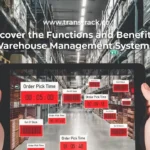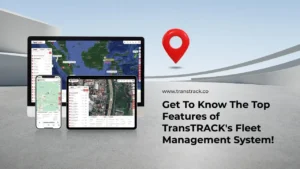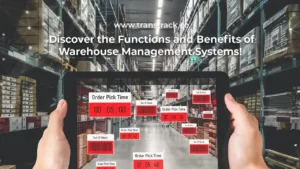Find Out What Are the Logistics Problems and Their Solutions!
Posted on July 6, 2023 by Nur Wachda Mihmidati

In the era of globalization and rapidly growing trade, logistics is an important part of business continuity. The logistics process plays a crucial role in maintaining the smooth distribution of goods from producers to consumers. However, many companies encounter various challenges in their logistics processes, often impeding their efficiency and effectiveness in business operations.
Some common issues that arise in the logistics process include insufficient information and communication, infrastructure problems such as inadequate port facilities and road infrastructure, high shipping costs, damaged goods during transit, inadequate tracking and tracing availability, undelivered items, poor maritime connectivity in Indonesia, and a lack of transporter finances.
To address these issues, logistics companies must quickly adapt to new technologies and innovations that enhance their operational efficiency and effectiveness. In this article, we will discuss several solutions that can assist logistics companies in overcoming these challenges.
Common Challenges in the Logistics Process
Various issues often arise in the logistics process. These issues can be diverse, and in this article, we will explore the problems that can arise in the logistics process, namely:
Insufficient Information and Communication
In logistics, effective information and communication between all parties involved are crucial to maintaining supply chain continuity and ensuring timely deliveries. However, logistics companies often face difficulties in managing adequate information and communication among departments and vendors. This can result in delivery delays and increase the risk of loss or damage to goods. Therefore, logistics companies must effectively manage information and ensure good communication with all stakeholders involved in the logistics process.
Infrastructure Issues
Adequate infrastructure is essential for facilitating smooth logistics processes. However, several infrastructure problems commonly occur in logistics, including:
Port Infrastructure
Inadequate ports can cause delivery delays and increase transportation costs. Some frequent port issues include an excess of vessels beyond capacity, loading and unloading delays, and insufficient storage facilities.
Road Infrastructure
Damaged, congested, or obstructed roads can hinder vehicle movement and escalate transportation costs. This can lead to increased shipping expenses and prolonged delivery times.
Shipping Costs
Shipping costs can be a hindrance in logistics, particularly when facing fierce market competition. Several factors can influence shipping costs, including delivery distance, shipment volume, fuel expenses, and infrastructure costs. Therefore, logistics companies need to consider these factors when determining shipping prices to remain competitive in the market.
Goods Damaged in Transit
Goods can be damaged during transportation due to insufficient protection or inadequate transportation conditions. This can increase shipping costs and result in losses for the company. Consequently, logistics companies must ensure proper protection of goods during transit, and transportation conditions should be adequate to prevent any damage.
Tracking and Tracing Availability
Having sufficient information about shipment status is crucial in logistics. The lack of tracking and tracing availability can impede coordination and lead to delivery delays. Therefore, logistics companies need to provide adequate information about shipment status, such as tracking numbers, delivery schedules, and information regarding delayed or postponed deliveries.
Undelivered Items
Undelivered items are a frequent problem in the logistics process. Factors that can contribute to this issue include delivery errors, damaged goods, lost items, or complications with customs procedures. To avoid these problems, logistics companies must ensure they have clear and organized delivery procedures, prioritize the security of goods, and adhere to relevant customs regulations.
Maritime Connectivity in Indonesia
Poor maritime connectivity can hinder logistics in Indonesia. Common issues include inadequate ports, a shortage of cargo vessels, and ineffective transportation networks. This can result in delivery delays, increased transportation costs, and impact a company’s ability to meet customer demand. Therefore, the government and logistics companies must collaborate to improve maritime infrastructure and optimize inter-island connectivity in Indonesia.
Insufficient Transporter Finances
Logistics companies often face financial constraints, especially when they cannot secure sufficient funding to operate their businesses. Insufficient funds can affect a company’s ability to purchase vehicles and equipment necessary for facilitating deliveries, pay employee salaries, and develop their business. Therefore, logistics companies must pay attention to their financial management and ensure they have adequate funding sources to sustain their operations. Additionally, logistics companies can seek additional sources of funding, such as bank loans or investors.
[display-post-read-also]
Solutions for Handling Logistics Problems
Here are some solutions to address common logistics problems:
Organized Fleet Management
Organized fleet management is one of the keys to success in the logistics business. By ensuring an organized fleet, companies can guarantee timely delivery and prevent damage to goods. Companies can achieve this by ensuring that the vehicles used for delivery are in good condition, equipped with necessary safety equipment and other required tools. Additionally, companies should ensure that their fleet has a regular maintenance schedule and that vehicles are always inspected before use in deliveries.
Utilize Insurance
Logistics companies can consider using insurance to protect themselves from the risk of loss or damage to goods during transportation. By using insurance, companies can have peace of mind and reduce financial risks that may arise from damage or loss of goods. Furthermore, insurance can help logistics companies maintain good relationships with their customers, as they can offer security guarantees in the delivery of goods.
Cost Transparency
Shipping costs are one of the main challenges faced by logistics companies. Therefore, logistics companies should ensure that the shipping costs charged to customers are transparent and easily understood. In this regard, companies can use technology to ensure accurate and service-aligned shipping costs. Additionally, companies can offer different shipping cost options to meet customer needs.
Utilize Logistics Technology
Logistics technology is one of the best solutions to address common problems in the logistics process. Logistics companies can use technologies such as supply chain management systems, route mapping software, and delivery tracking systems to enhance efficiency and optimize deliveries. Furthermore, technology can help logistics companies obtain real-time information about the status of deliveries and identify issues early on for prompt resolution.
In addressing logistics problems, the use of logistics technology such as the Transportation Management System (TMS) TransTRACK can be an effective solution. TransTRACK is a logistics management platform that assists logistics companies in efficiently and effectively managing deliveries. By using TransTRACK, logistics companies can monitor deliveries from start to finish, map out the most efficient delivery routes, and obtain real-time information about the status of deliveries. Additionally, TransTRACK can also help logistics companies minimize shipping costs and improve customer service.
By adopting TransTRACK, logistics companies can reduce common logistics problems such as lack of information and communication, high shipping costs, and a lack of cost transparency. Therefore, if you want to optimize your logistics processes, it is advisable to consider using TransTRACK as an effective and efficient solution.
Recent Post
Topic :
logisticlogistics problems and solutionslogistics problems in Indonesia
 Bahasa Indonesia
Bahasa Indonesia









